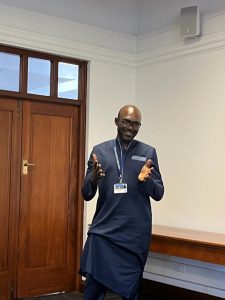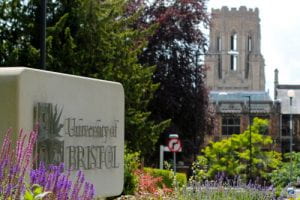It is six months since I became Vice-Chancellor of the University of Bristol. My thanks to everyone who has helped me get to know the University and the City in all their brilliance and boldness. I have seen such great things happening but have also had numerous conversations about individual and collective challenges. I appreciate the open way in which colleagues, students and other members of our broader Bristol community have shared their insights, ideas and opinions.
I wanted to take time to write down my reflections and share some of what I see as the future for our University in light of those discussions. I do so in the knowledge that not all is well in Higher Education across the UK, or indeed globally, as I write this in South Africa during my first trip abroad on behalf of Bristol. However, while some of what I say below is quite sobering, I am optimistic about the future. Everywhere I’ve been (whether it has been a Bristol, Pretoria or Cape Town classroom), I have met such extraordinary people who are determined to do, and be, their very best.
As part of my trip, I have been visiting our strategic partner, the University of Cape Town, who, like us, have ambitious plans that take them to 2030. Like us, they also have concerns about student fees, accommodation costs and the need for greater inclusion, social and racial justice, and access to the benefits of Higher Education.




While we also have considerable differences, there are some fundamental shared issues. Declining home fees no longer cover the actual costs of tuition; we are increasingly dependent on international fees or philanthropy to cover gaps in research funding and education. For public institutions that don’t have large endowments, there are few easy answers.
I don’t need to remind you that, at Bristol, while our income is constrained by caps on home tuition fees, our costs are not. Inflation has hit everybody personally. Our students are worried about how far their maintenance grant will stretch. Colleagues are understandably concerned about rising costs, pay and pensions. It has hit the University as an institution as well. Some of this isn’t new, and these growing financial pressures have led to staff strikes and student protests in Higher Education for almost five consecutive years. But post-COVID, things really do need to change. The goodwill that has kept our system working is fraying at every level.
But if this is the challenge, there is some hope on the horizon in the United Kingdom. Our unions and Universities UK have agreed a joint statement on pensions which we endorse, and while negotiations on pay may have concluded, we support ongoing talks on broader working conditions.
I have been out listening to colleagues in numerous venues, from individual meetings at my monthly VC surgeries to picket line conversations. I have heard sensible suggestions about practical steps that we can take to be more effective and efficient, as well as exciting ideas for new opportunities. In turn, I have done my best to explain why we need to change our approach to University finances and decision-making, ensuring we simplify processes, reduce bureaucracy and build more trust into our systems. I know there is more to do to explain how we make investment decisions, particularly in terms of capital expenditure.
This does mean change, something that I know can elicit groans of “not again!”
Let me explain what is being proposed and why. Our current University Executive Board is very large, with more than 25 members. We also have a Strategic Implementation Board, featuring essentially the same people, monitoring our progress against our strategy and agreeing investments that will help deliver our aims. A host of committees feed into these two groups, including the Academic Leadership Group, Operations Board, Portfolio Boards and other groups which oversee implementation of the various themes of our strategy. Faculties and Directorates have their own layers of meetings, which should join up with these senior-level university groups but often don’t. Then there is Senate, a key academic body, which has its own essential groups that meet and report regularly.
Universities are complex places, but as the description above suggests, we can build in more complexity than is really needed. These committees and meetings consume people’s attention, focus and time.
My ambition is for Bristol to be more open, trustworthy and trusting, restoring energy by placing authority where it is needed most. With greater autonomy comes greater local accountability. Within agreed guidelines, and referring to specific expertise when needed, we should trust one another to do our very best.
To make this possible, Judith Squires has been leading a review of our academic leadership structures, drawing upon ideas from a working group drawn from Senate members. I’ve been clear with that group from the beginning that I do need a smaller number of Deans on our University Executive and that, above all, Schools need greater visibility and autonomy. The working group, in turn, has come up with a range of ways in which this could be made possible, while retaining elements of the current structures they believe are valuable.
In the Spring, therefore, we will be appointing three Executive Deans for Health & Life Sciences, Arts, Social Sciences & Law and Science & Engineering, initially for a period of up to two years. Executive Deans will work with colleagues to define, within agreed overarching university guidelines, local frameworks that work for their Schools, staff and students. These appointments will be made from the current cohort of Deans or equivalents to ensure some continuity as we work through the detail of the changes over the next eighteen to twenty-four months.
What does this mean for Professional Services (PS) colleagues? Simplified Faculties, and Schools with more responsibility and accountability will need appropriate levels of PS support (balanced across local and central teams) with appropriately streamlined processes and systems. Work to create efficient and effective PS teams is now underway at Bristol and engagement on this will continue. Lucinda Parr is leading this work. Over the next six months she will be leading a process to define the structures required to give Executive Deans and Heads of School the help they need. Lucinda will be supported in this by a new Executive Director of Faculty Operations, who will be appointed over the summer to help us evolve the Faculty PS model in support of our strategy. More information about the changes can be found here and here.
I realise there will be some anxiety around implementing changes. This is why we are moving swiftly to make the direction of travel clear while also taking time to implement the detail, which will include confirming how students are represented in our decision-making.
While University structures matter, they are the mechanism for delivering our ambitions, not an ambition in their own right. We have a lot to do and a lot to deliver by 2030. We have a bold strategy and a new campus to open in 2026. We face serious issues around climate change and meeting our Net Zero commitments, with or without offsetting. We are part of a city that is changing all around us. We need to contribute to its overall prosperity, not just our own. As just one of many examples of how we make this work, our city is home to the Bristol Robotics Laboratory, where last month I signed an agreement with UWE Vice-Chancellor Steve West, formalizing our ten-year partnership commitment in what is the largest academic centre for robotics research in the UK.
On practical matters, let me finish by outlining some major financial decisions that we have recently made or are in the process of deciding. There are often concerns that we invest more in buildings than in people, but that isn’t the case: at Bristol more than 50% of our income goes on salaries. Nonetheless, our people need the right infrastructure within which to work. The Board of Trustees has approved recommendations to modernize our computing network. They have also approved a major upgrade to our teaching and learning facilities in the Veterinary School, as well as the extension on our lease of Maggs House, enabling more innovative student-focused space to be developed on the Clifton Campus. At the end of March, the Board will also make the final decision on the construction of the main CM1 building at Temple Quarter, a key moment in planning that has been ongoing since the idea of a new campus was first discussed almost a decade ago.
This is exciting. This is ambitious. This is bold. This is why I came to Bristol.
I realise that some of what I have written may raise more questions for you. We can pick these up either in our next town-hall live-stream meeting or you can always email me at vice-chancellor@bristol.ac.uk.
Thank you again for the welcome shown to me over these first six months and the work that each and every one of you does to make us such a special place. I look forward to meeting with many more of you in the weeks and months ahead.


 Partnership is key to our 2030 vision. I very much enjoyed meeting with the CEO of the SS Great Britain to look at how we can build on our long-standing collaboration and was very excited to meet ‘Brunel’ (right) when I spent an evening on the ship as part of our public engagement event, FUTURES 2022 – the largest showcase of research and innovation in the region. I sat down with the CEOs of the Bristol and Weston NHS Trust and the North Bristol Trust to discuss how much more we could do together to tackle health inequalities in the city. I’ve been out to the National Composites Centre and spoken about the entrepreneurship we see at Bristol and the contributions we make to our broader area at the Western Gateway Development Conference.
Partnership is key to our 2030 vision. I very much enjoyed meeting with the CEO of the SS Great Britain to look at how we can build on our long-standing collaboration and was very excited to meet ‘Brunel’ (right) when I spent an evening on the ship as part of our public engagement event, FUTURES 2022 – the largest showcase of research and innovation in the region. I sat down with the CEOs of the Bristol and Weston NHS Trust and the North Bristol Trust to discuss how much more we could do together to tackle health inequalities in the city. I’ve been out to the National Composites Centre and spoken about the entrepreneurship we see at Bristol and the contributions we make to our broader area at the Western Gateway Development Conference.